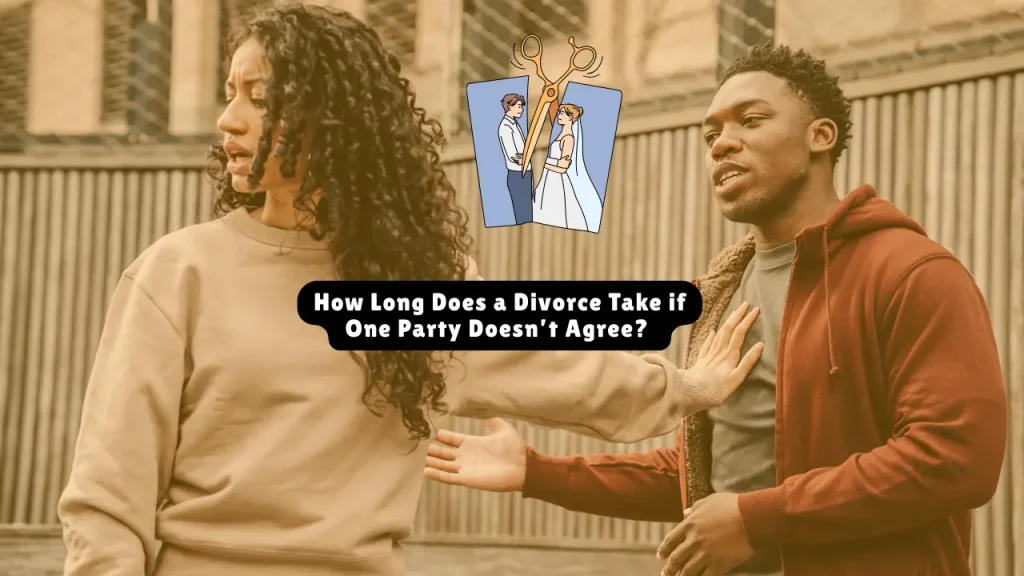How Long Does a Divorce Take if One Party Doesn’t Agree? Timeline & Strategies
When one spouse disagrees — a contested divorce — it usually takes 1–3 years, sometimes even longer if the case is highly complex.Unlike uncontested divorces (3–6 months), contested divorces involve court intervention, discovery, hearings, mediation, and potentially trial — all of which extend the process significantly.
Below, we explain why contested divorces take longer, what factors influence the timeline, real-life examples, and actionable strategies to navigate the process.
Table of Contents
Why Does a Contested Divorce Take So Long?
When one spouse contests the divorce or refuses to agree on key terms, the court must resolve disputes, which requires formal legal procedures, such as:
- Discovery (exchanging financial & other records)
- Preliminary hearings (on custody, support, home use)
- Mediation or settlement conferences
- Trial if no agreement is reached
If a spouse is uncooperative — e.g., hides assets, ignores court orders, or files excessive motions — the timeline can stretch to 3–5+ years and cost $20,000–$100,000+.
Typical Timeline of a Contested Divorce: Stage-by-Stage
Here’s an approximate breakdown:
| Stage | Time Frame (Typical) |
| Filing & Service | 1–3 weeks |
| Response from Other Party | 20–30 days (varies by state) |
| Preliminary Hearings | 2–6 months |
| Discovery Phase | 3–9 months |
| Mediation & Negotiations | 1–12 months |
| Trial & Judgment | 6–18+ months |
| Total | ~12–36 months (sometimes longer) |
Real-Life Examples
- Custody Dispute in Texas: John & Lisa fought over custody, enduring 18 months of mediation & hearings before a trial concluded at 26 months.
- Hidden Assets in New York: Sarah & Tom’s dispute over a business dragged on 3.5 years, with discovery alone taking 11 months.
- Swift Resolution in Florida: Mike and his spouse settled spousal support during mediation at the 8-month mark, avoiding trial.
- CEO’s Offshore Assets in Texas (2023): Discovery of hidden $2M extended the divorce to 4 years.
- Special-Needs Custody in Florida (2024): Multiple evaluations stretched proceedings to 3.5 years.
Related article: What is a Wife Entitled to in a Divorce in Pennsylvania?

Factors That Can Delay a Divorce
Here are the most common reasons contested divorces drag on:
Child Custody Disputes — Parenting evaluations and Guardian ad Litem reports can add 6–12 months.
Complex Assets/Debts — Businesses, investments, or hidden assets take months to resolve.
Court Backlogs — Some states have congested dockets, delaying hearings for months.
Uncooperative Spouse — Avoiding service, hiding records, or ignoring orders slows everything down.
Attorney or Scheduling Conflicts — When parties or lawyers are unavailable, hearings are postponed.
Bad-Faith Tactics — Frivolous motions or refusal to mediate wastes time and can incur penalties.
State-Specific Timelines (Approximate)
| State | Minimum Waiting Period | Average Contested Divorce Time |
| California | 6 months | 18–36 months |
| Texas | 60 days | 12–18 months |
| New York | None | 18–36 months (often longer) |
| Florida | 20 days | 12–24 months |
| Illinois | 6 months | 12–30 months |
Hidden Costs of Prolonged Divorces
Financial Strain — Legal fees, court costs, and divided income add up quickly.
Emotional Toll — Long disputes increase anxiety & depression (68% in contested vs. 22% in uncontested cases).
Impact on Children — Kids in 3+ year divorces show more behavioral & academic problems.
Court-Imposed Outcomes — The longer you delay, the less control you retain.
Step-by-Step Strategies to Shorten a Contested Divorce
Respond Promptly — Ignoring the petition risks default judgment.
Hire an Experienced Divorce Lawyer — One familiar with local judges & rules can help settle faster.
Gather Documentation Early — Be ready with tax returns, deeds, bank statements, and proof of expenses.
Leverage Mediation Early — Even if full agreement isn’t reached, partial agreements save months.
Limit Discovery Requests — Target only essential information to avoid drawn-out “fishing expeditions.”
Use Temporary Agreements — Negotiate interim custody & support terms to avoid repeated hearings.
Accept Strategic Compromises — Sometimes winning 60–70% quickly is better than fighting endlessly.
Stay Professional & Cooperative — Judges may penalize obstruction and reward cooperation.
Mental Health — Therapists & support groups help manage the emotional toll.
Real Scenarios: Strategic Approaches That Worked
Texas: CEO’s hidden accounts uncovered; but proactive discovery limited damage to 4 years.
Florida: Parents negotiated custody during mediation and saved nearly a year.
New York: Despite backlog, strategic compromises avoided trial and cut 14 months from timeline.
Helpful Resources
National Center for State Courts – Court information
Legal Aid Directory – Free or low-cost help
LawHelp.org – Understand your state’s laws
American Bar Association – Family Law Section
APA Therapist Locator – Divorce support
Key Takeaways
A contested divorce often takes 1–3+ years, while uncontested ones finish in 3–6 months.
The more disputes (custody, property, support), the longer it takes.
Courts encourage settlement at all stages.
Staying organized, cooperative, and realistic can shorten your divorce.
Professional guidance is crucial to avoid mistakes and delays
About the Author

Sarah Klein, JD, is a former family law attorney with over a decade of courtroom and mediation experience. She has represented clients in divorce, custody cases, adoption, Alimony, and domestic violence cases across multiple U.S. jurisdictions.
At All About Lawyer, Sarah now uses her deep legal background to create easy-to-understand guides that help families navigate the legal system with clarity and confidence.
Every article is based on her real-world legal experience and reviewed to reflect current laws.
Read more about Sarah
